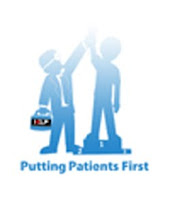What is high blood pressure?
Blood pressure is a measure of how hard the blood pushes against the walls of your arteries as it moves through your body. It's normal for blood pressure to go up and down throughout the day, but if it stays up, you have high blood pressure. Another name for high blood pressure is hypertension.
When blood pressure is high, it starts to damage the blood vessels, heart, and kidneys. This can lead to heart attack, stroke, and other problems. High blood pressure is called a "silent killer,'' because it doesn't usually cause symptoms while it is causing this damage.
Your blood pressure consists of two numbers: systolic and diastolic. Someone with a systolic pressure of 120 and a diastolic pressure of 80 has a blood pressure of 120/80, or "120 over 80." Blood pressure is measured in millimeters of mercury (mm Hg).
- The systolic number shows how hard the blood pushes when the heart is pumping.
- The diastolic number shows how hard the blood pushes between heartbeats, when the heart is relaxed and filling with blood.
An ideal blood pressure for an adult is less than 120/80. High blood pressure is 140/90 or higher. Many people fall into the category in between, called prehypertension. People with prehypertension need to make lifestyle changes to bring the blood pressure down and help prevent or delay high blood pressure.
About 1 out of 3 adults in the United States has high blood pressure.1
What causes high blood pressure?
In most cases, doctors can't point to the exact cause. But several things are known to raise blood pressure, including being very overweight, drinking too much alcohol, having a family history of high blood pressure, eating too much salt, and getting older.
Your blood pressure may also rise if you are not very active, you don't eat enough potassium and calcium, or you have a condition called insulin resistance.
What are the symptoms?
High blood pressure doesn't usually cause symptoms. Most people don't know they have it until they go to the doctor for some other reason.
Very high blood pressure can cause severe headaches and vision problems. These symptoms can also be caused by dangerously high blood pressure called malignant high blood pressure. It may also be called a hypertensive crisis or hypertensive emergency. Malignant high blood pressure is a medical emergency.
How is high blood pressure diagnosed?
Most people find out that they have high blood pressure during a routine doctor visit. For your doctor to confirm that you have high blood pressure, your blood pressure must be at least 140/90 on two separate occasions. It is usually measured 1 to 4 weeks apart.
You may have to check your blood pressure at home if there is reason to think the readings in the doctor's office aren't accurate. You may have what is called white-coat hypertension, which is blood pressure that goes up just because you're at the doctor's office.
How is it treated?
If you have high blood pressure, your doctor will give you a blood pressure goal. Your goal will be based on your health and your age. An example of a goal is to keep your blood pressure below 140/90.
You can help lower your blood pressure by making healthy changes in your lifestyle. If those lifestyle changes don't work well enough, you may also need to take pills. Either way, you will need to control your high blood pressure throughout your life.
Treatment depends on how high your blood pressure is, whether you have other health problems such as diabetes, and whether any organs have already been damaged. Your doctor may also check your risk for other problems, such as heart attack and stroke.
Most people take more than one pill for high blood pressure. Work with your doctor to find the right pill or combination of pills that will cause the fewest side effects.
What can you do to prevent high blood pressure?
Making lifestyle changes can help you to prevent high blood pressure. You can:
- Stay at a healthy weight or lose extra weight.
- Eat heart-healthy foods and limit sodium.
- Exercise regularly.
- Limit alcohol to 2 drinks a day for men and 1 drink a day for women.
Our topics will teach you about




No comments:
Post a Comment